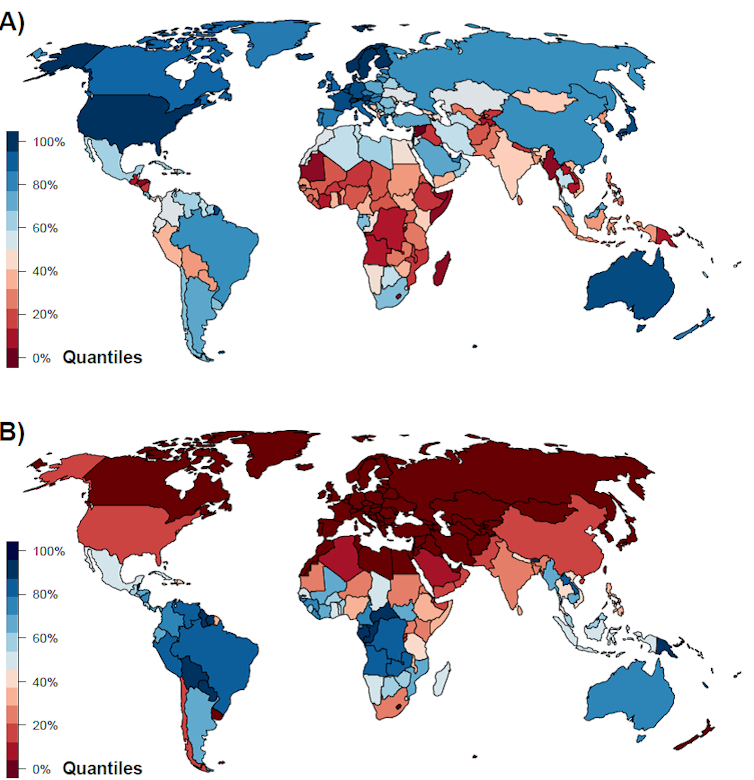Nowhere is nature more vibrant than in Earth’s tropical forests. Thought to contain more than half of all plant and animal species, the forests around Earth’s equator have sustained foragers and farmers since the earliest days of humanity. Today, their bounty underpins much of our globalised diet and holds vast potential for new and existing medicine. Those that remain lock up billions of tonnes of carbon dioxide each year, providing the best natural solution for climate change. There is no credible path to net zero emissions in which tropical lands are ignored.
Nations are clamouring for information on how much carbon tropical forests can keep out of a rapidly warming atmosphere to help limit global warming to well below 2°C. The best way to study these forests is through long-term measurements taken in carefully defined plots, one tree at a time, year-after-year. These plots tell us what species are present and need help, which forests store the most carbon and grow fastest and which trees excel at resisting heat and producing timber.
Far from the laboratories and capital cities where forests are studied and legislated upon, tropical people gather the data that forms the basis of our knowledge about these vital ecosystems. Conventional wisdom might suggest that making all their data freely accessible is egalitarian. But for the people measuring tropical forest species and carbon, offering the fruits of their labour without fair investment won’t reduce inequalities – it will increase them.
That’s because those gathering the data in tropical forests are extraordinarily disadvantaged compared to the researchers and policymakers who use it. Field workers can put their lives at risk to expand the world’s understanding of one of its best bulwarks against climate change and its biggest repository of biodiversity. For this, they receive scant protection and meagre compensation.
Valuing these workers is essential to make the most of what nature can offer to tackle biodiversity loss and the climate crisis. For example, tropical forests have an unparalleled ability to absorb carbon from the atmosphere. But without measuring this, the potentially massive contribution of tropical forests to slowing climate change will be overlooked, undervalued and inadequately paid for.
Now, 25 leading researchers in tropical forest science from Africa, Asia, Europe, North and South America are demanding an end to the exploitation which undermines the sustainability of forests themselves.
Precarious, dangerous and underfunded
Measuring the biodiversity and carbon of a single hectare of Amazon forest requires collecting and identifying up to ten times the number of tree species present in the UK’s entire 24 million hectares. The skill, risks and costs involved in gathering this information are ignored by those who expect it for free.

How (a) 2008–2018 national average GDP per capita compares with (b) tropical forest area. Lima et al. (2022), Author provided
Fieldworkers risk their lives to measure and identify remote tropical trees. Many face the threat of kidnapping and murder, not to mention natural hazards like snake bites, floods and fires. Most long-term workers have endured infectious diseases such as malaria and typhoid, as well as dangerous transport and the risk of gender-based violence. But they may be out of work as soon as the data are collected. How many of those using their outputs to calibrate satellite instruments or write high-level reports, like the recent one from the Intergovernmental Panel on Climate Change, will face similar conditions?
It costs an estimated US$7 million a year to measure how much carbon is sequestered by intact tropical forests. This easily exceeds piecemeal funding by a handful of charities and research councils. Because investment in field research is so inadequate, tropical nations have little idea how their forests are faring as climate change accelerates. They’re unable to say which are slowing it and lack the bargaining power to raise the finance needed to protect them.
Meanwhile, the US spends over US$90 million annually on its national forest inventory. Wealthy countries have a firm understanding of their forest carbon balances, and have little trouble demonstrating to the world the contributions their forests make to slowing climate change.
A fair deal for field workers
A different approach must put the needs of data gatherers first and demand those benefiting from their efforts contribute funding and other support. Equal collaboration should be the goal of funders, producers and users of tropical forest science alike.
For that to happen, research funding must cover not only the costs of acquiring the data, but also of training and guaranteeing safe and secure employment for forest workers. Involving local communities is critical too – they often own the forests and need economic opportunities as much as anyone. After the fieldwork, there should be funding for the essential work of curating, managing and sharing the data.
Authors and journals who publish scientific studies on tropical forests can help by always including the people who collect the data as authors and publishing in their languages, rather than assuming English is enough.
Everyone could eventually benefit from the open sharing of data. After all, the tree of knowledge yields many fruits. But unless we dedicate ourselves to sustaining its roots, there will be little left to harvest.
Oliver Phillips, Professor of Tropical Ecology, University of Leeds; Aida Cuni Sanchez, Associate Professor of Environmental Sciences, Norwegian University of Life Sciences and Honorary Research Fellow, University of York, and Renato Lima, Associate Research Scientist in Forest Ecology, Universidade de São Paulo
This article is republished from The Conversation under a Creative Commons license. Read the original article.





